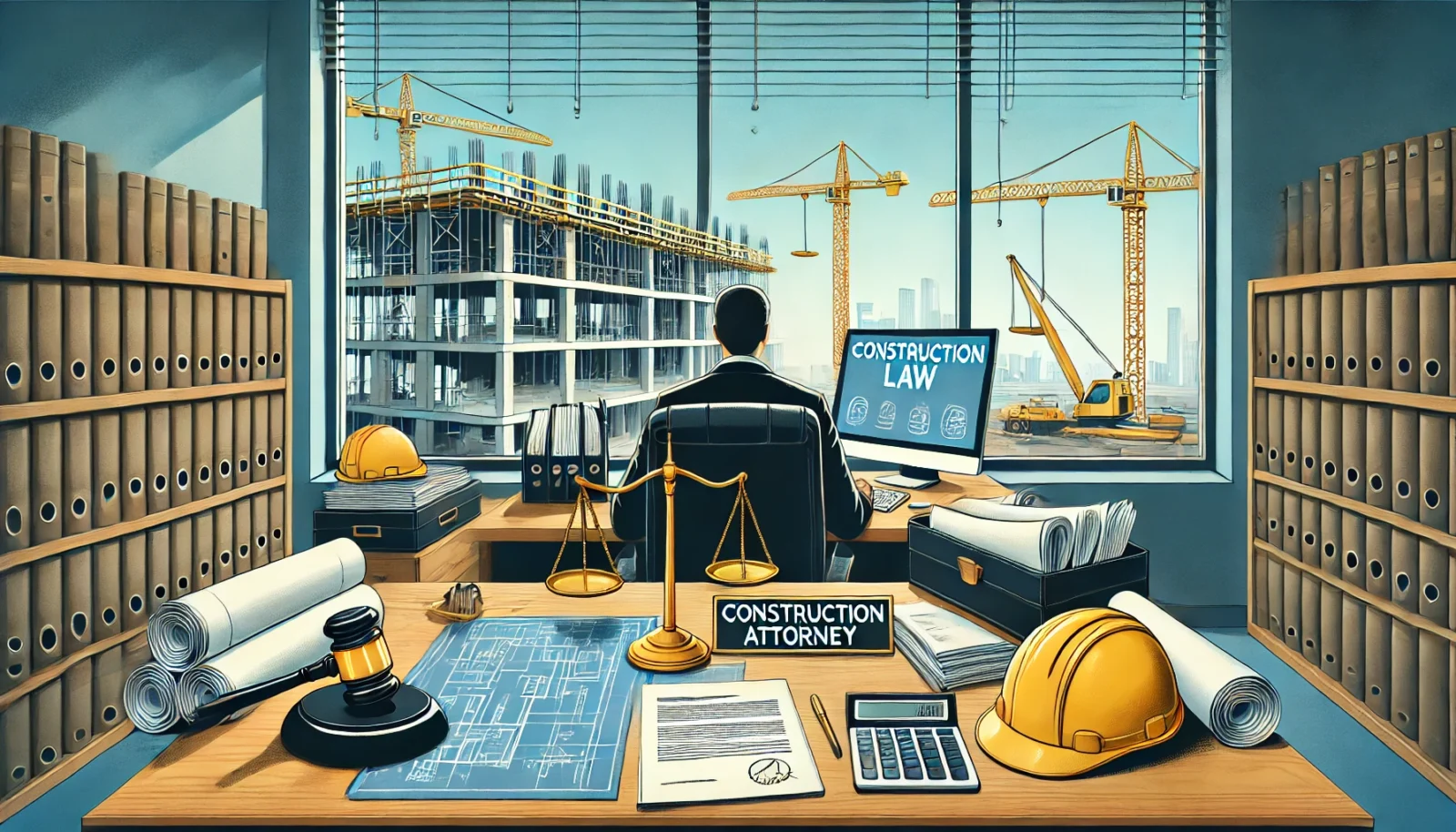Introduction To Construction Attorneys
A construction attorney is a legal professional who specializes in issues related to construction projects. These lawyers focus on legal matters that arise in the building and renovation sectors. Their expertise covers contract disputes, project delays, safety regulations, and compliance with local laws.
In the industry, construction attorneys play a crucial role. They help clients navigate the complex legal landscape of construction. Whether it is a contractor, developer, or property owner, having a construction attorney ensures that their interests are protected. They offer advice on drafting and reviewing contracts to avoid legal issues and represent clients in disputes or claims. By providing legal support and guidance, construction attorneys help to prevent costly legal battles and ensure that construction projects proceed smoothly. Their work is essential for maintaining order and addressing legal concerns that can impact the success of construction projects.
Roles And Responsibilities
Construction attorneys have several important roles and responsibilities. One key role is to provide legal advice for construction projects. They guide clients on various legal aspects to ensure projects follow the law. Another crucial task is contract review and negotiation. They examine contracts to ensure they are fair and protect their client’s interests, and they negotiate terms to avoid potential disputes.
Construction attorneys also handle dispute resolution and litigation. When disagreements or conflicts arise, they work to resolve them either through negotiation or in court. They are skilled in managing legal disputes to minimize delays and costs. Lastly, construction attorneys ensure compliance with local and federal regulations. They help clients understand and adhere to building codes, safety standards, and other legal requirements. This compliance is essential for avoiding legal penalties and ensuring that projects meet all necessary legal standards. Overall, construction attorneys play a vital role in keeping construction projects legally sound and running smoothly.
Common Issues Handled By Construction Attorneys
Construction attorneys handle a variety of common issues in the construction industry. One major issue is contract disputes. These can arise when parties involved in a construction project disagree on the terms of the contract or its execution. Construction attorneys work to resolve these disputes by interpreting contract terms and negotiating solutions.
Another common issue is construction defects and liabilities. These defects can include problems with the quality of work or materials used. Construction attorneys help clients address these issues by assessing liability and seeking remedies, such as repairs or compensation.
Delays and project abandonment are also frequent problems. Delays can disrupt timelines and increase costs, while project abandonment can lead to incomplete work. Construction attorneys assist in managing these situations, aiming to resolve delays or find solutions if a project is left unfinished.
Lastly, payment issues and mechanic’s liens are critical concerns. Construction attorneys deal with disputes over payments and help clients file mechanic’s liens when payments are not made. Mechanic’s liens are legal claims against a property to secure payment for work done. Handling these issues effectively ensures that contractors and subcontractors receive the payments they are owed.
The Construction Attorney’s Role In Contract Management
Construction attorneys play a vital role in contract management. One of their key responsibilities is drafting and reviewing construction contracts. They create clear and comprehensive contracts that outline the responsibilities and expectations of all parties involved. By reviewing existing contracts, they ensure that all terms are fair and legally sound.
Another important aspect of their role is ensuring compliance with contractual obligations. Construction attorneys monitor that all parties adhere to the terms of the contract. They help address any issues or breaches that arise, ensuring that the project stays on track and within legal requirements.
Modifications and amendments to contracts are also part of their work. If changes are needed during a project, construction attorneys handle these adjustments carefully. They ensure that any modifications are properly documented and legally binding. This helps prevent disputes and ensures that all changes are agreed upon by everyone involved. Overall, construction attorneys are essential for managing contracts effectively, keeping projects compliant and well-regulated.
Dispute Resolution And Litigation
In dispute resolution and litigation, construction attorneys handle several key tasks. Mediation and arbitration are common methods they use to resolve conflicts. Mediation involves a neutral third party helping the parties reach a mutual agreement, while arbitration is a more formal process where an arbitrator makes a binding decision. Construction attorneys guide their clients through these processes to achieve a fair resolution.
When disputes cannot be resolved through mediation or arbitration, construction attorneys may need to engage in filing and defending lawsuits. They represent their clients in court, presenting evidence and arguments to support their case. This involves preparing legal documents, gathering evidence, and arguing on behalf of their clients.
Settlement negotiations are another crucial aspect of their role. Before or during litigation, construction attorneys work to negotiate settlements between parties. They aim to reach an agreement that resolves the dispute without the need for a full trial. These negotiations help avoid the time and expense of court proceedings and can lead to a more efficient resolution of the conflict.
How Construction Attorneys Help With Regulatory Compliance
Construction attorneys play a crucial role in ensuring regulatory compliance for construction projects. They start by understanding building codes and safety regulations. These codes set the standards for construction quality and safety. Construction attorneys ensure that projects comply with these codes, helping to avoid legal issues and potential penalties.
Navigating zoning laws and permits is another important aspect. Construction attorneys help clients understand local zoning regulations, which dictate how property can be used and developed. They also assist in obtaining the necessary permits required for construction, ensuring that all legal permissions are in place before work begins.
Environmental regulations are also a key area where construction attorneys provide assistance. These regulations are designed to protect the environment during construction. Construction attorneys help clients comply with laws related to waste disposal, pollution control, and other environmental concerns. By guiding clients through these complex regulations, they help ensure that projects are environmentally responsible and legally compliant.
Choosing The Right Construction Attorney
Choosing the right construction attorney involves several important factors. First, consider their experience. A lawyer with extensive experience in the construction industry is likely to have a better understanding of the specific challenges and legal issues that may arise. Look for a construction attorney who has handled cases similar to yours.
Specialization is another crucial factor. Some attorneys may focus on particular areas within construction law, such as contract disputes or regulatory compliance. Ensure that the construction attorney you choose specializes in the areas relevant to your needs.
Reputation also matters. Research the construction attorney’s reputation by reading reviews, asking for referrals, and checking their track record. A good reputation often indicates a high level of competency and client satisfaction.
During the initial consultation, ask key questions to gauge their suitability. Inquire about their experience with cases like yours, their approach to handling your issue, and their expected timeline for resolution.
Finally, understand legal fees and billing structures. Discuss how the construction attorney charges for their services, whether it’s a flat fee, hourly rate, or contingent fee. Make sure you are clear on all potential costs to avoid unexpected expenses.
Case Studies And Examples
Construction attorneys often handle complex and challenging cases. Examples of successful cases illustrate their expertise. For instance, one notable case involved a construction attorney resolving a major contract dispute between a contractor and a property owner. The attorney negotiated a settlement that allowed the project to continue while compensating the contractor for delays caused by the owner’s changes.
Another successful example includes a case where a construction attorney defended a contractor against claims of construction defects. The attorney’s thorough review and expert witness testimony demonstrated that the defects were due to factors outside the contractor’s control, leading to a favorable outcome for the client.
Lessons learned from notable disputes provide valuable insights. In one case, a failure to clearly define contract terms led to a prolonged dispute over project scope and responsibilities. This highlighted the importance of precise and detailed contract drafting to prevent misunderstandings.
Another lesson came from a case involving delays caused by unforeseen environmental regulations. This underscored the need for comprehensive knowledge of regulatory requirements and proactive management to address potential compliance issues before they escalate into disputes. These examples emphasize the critical role construction attorneys play in both preventing and resolving legal challenges in construction projects.
How To Prepare For A Consultation With A Construction Attorney
Preparing for a consultation with a construction attorney involves a few key steps. First, gathering relevant documentation is crucial. Collect all documents related to your construction project, including contracts, permits, correspondence, and any records of disputes or issues. Having these documents organized will help the construction attorney understand your situation quickly and accurately.
Next, outline your concerns and objectives. Before the meeting, make a list of specific issues you need help with, such as contract disputes, regulatory compliance, or project delays. Clearly define your goals for the consultation, whether it’s seeking advice, resolving a dispute, or understanding your legal options. This will help the construction attorney address your needs effectively.
Lastly, understand the legal process. Familiarize yourself with basic legal terms and processes related to construction law. While the construction attorney will guide you through the specifics, having a basic understanding of how legal matters are handled can make the consultation more productive and ensure you ask relevant questions. Being well-prepared helps ensure that the consultation is efficient and that you get the most out of your meeting with the construction attorney.
Benefits Of Hiring A Construction Attorney
Hiring a construction attorney offers several significant benefits. One major advantage is risk mitigation. Construction attorneys help identify and address potential legal issues before they become major problems. They ensure that contracts are clear and compliant with regulations, reducing the likelihood of disputes and costly litigation.
Another benefit is enhanced project management. With a construction attorney on your team, you gain expert guidance on managing legal aspects of your project. They assist with contract negotiations, compliance with local laws, and resolving any issues that arise. This support helps keep your project on track and within legal boundaries.
Legal protection and peace of mind are also important benefits. Knowing that a construction attorney is handling your legal matters allows you to focus on other aspects of your project. They provide legal representation and advice, ensuring that your interests are protected and that you have someone to turn to if disputes or legal challenges arise. Overall, a construction attorney provides valuable support that helps safeguard your project and your investment.
Construction Attorney Vs. Other Legal Professionals
When comparing a construction attorney with other legal professionals, there are notable differences.
Construction attorneys specialize in the specific legal issues related to construction projects. They focus on contract disputes, compliance with building codes, and handling issues like delays or defects. Their expertise includes understanding the intricacies of construction law and industry-specific regulations.
In contrast, general attorneys handle a broad range of legal matters without specialized focus. While they may offer legal advice on various topics, they lack the in-depth knowledge of construction-specific issues. General attorneys may not fully grasp the complex regulations and common disputes that arise in construction projects.
Comparing construction attorneys with real estate attorneys, the differences are more defined. Construction attorneys are experts in legal matters directly related to the construction process, including contract negotiations and construction defects. Their work is closely tied to the physical aspects and execution of construction projects.
Real estate attorneys, on the other hand, focus on property transactions, land use, and real estate investments. They handle issues such as property transfers, zoning laws, and real estate contracts, which are broader and less focused on the actual construction work.
In summary, while both types of attorneys deal with property-related issues, construction attorneys offer specialized knowledge and support for construction projects, whereas real estate attorneys handle property transactions and land use.
Trends And Changes In Construction Law
Construction law is continuously evolving with recent developments and legal reforms shaping the industry. One notable trend is the increasing focus on sustainability and green building practices. Recent legal reforms are incorporating stricter environmental regulations, promoting energy efficiency, and encouraging the use of sustainable materials. These changes reflect a growing emphasis on reducing the environmental impact of construction projects.
Another significant development is the rise of technology and digital tools in construction law. Innovations such as Building Information Modeling (BIM) and digital contract management systems are transforming how projects are planned, executed, and monitored. Legal reforms are adapting to these technological advancements, addressing issues related to data security, intellectual property, and the integration of technology in contracts.
Emerging issues in construction law include increased scrutiny on worker safety and labor rights. There is a growing focus on ensuring safe working conditions and fair labor practices, with new regulations aimed at protecting workers on construction sites. Additionally, disputes related to contractual obligations and project delays are becoming more complex, driven by the need for greater transparency and accountability in project management.
Overall, these trends and changes in construction law highlight the need for construction attorneys to stay informed and adapt to the evolving legal landscape to effectively support their clients.
Conclusion
In summary, construction attorneys play a crucial role in the construction industry. They offer specialized knowledge and support in various areas, including contract management, regulatory compliance, and dispute resolution. Their responsibilities encompass drafting and reviewing contracts, ensuring adherence to legal obligations, and handling conflicts that arise during construction projects.
Key points include their ability to mitigate risks by addressing potential legal issues early, enhance project management through expert guidance, and provide legal protection and peace of mind. They ensure that projects comply with building codes, zoning laws, and environmental regulations, and they manage disputes through mediation, arbitration, or litigation.
Final thoughts emphasize the critical importance of having a construction attorney involved in any significant construction project. Their expertise helps prevent costly legal disputes, ensures projects run smoothly, and protects the interests of all parties involved. Whether dealing with contract issues, regulatory compliance, or project-related disputes, a construction attorney provides invaluable support that contributes to the successful completion of construction projects and the safeguarding of legal and financial interests.
To read more, visit our blog page. We do have more topics!














Got a Questions?
Find us on Socials or Contact us and we’ll get back to you as soon as possible.